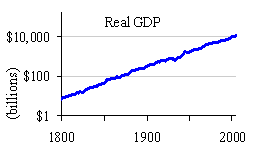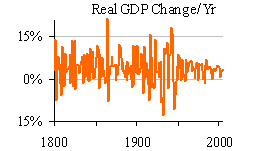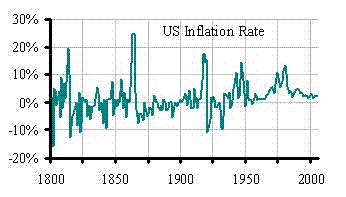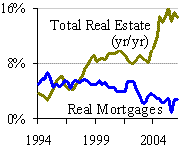Skip to comments.
How US mortgage debt could cause a global financial crisis
Moneyweek.com ^
| 7-5-06
| Dan Denning
Posted on 07/06/2006 6:40:55 AM PDT by Hydroshock
In the US, Fannie Mae (FNMA) and Freddie Mac are Government Sponsored Enterprises (GSEs) which buy residential mortgages and repackage them to sell on as mortgage-backed bonds. Although these bonds are not backed by the US government, most believe the GSEs would never be allowed to fail. But Dan Denning reports below on how a US Treasury report has warned that this mistaken belief and the illiquid nature of property means that an ‘interest rate shock’ could topple the US mortgage market – making the Long Term Capital Management (LCTM) crisis look like a walk in the park...
Could this LEAKED stock market ‘blueprint’ make you rich? A leaked stock market blueprint shows how it IS possible to forecast how – and when – ANY market is going to move... with a high degree of accuracy!
FREE! MoneyWeek's daily investment email.
Best of the Day Article What's more likely - stagflation or depression? Are we about to see a return to the 1970s? The US is at war, oil prices are soaring, the Federal Reserve is hiking rates – it’s no surprise many analysts are experiencing déjà vu. But as Mike Shedlock... Every once in a while, a report comes out from a government agency that’s so unassumingly candid you're forced to admit a mistake has been made and that the document was mistakenly leaked, or that its author will soon be fired.
I couldn't help thinking something like that when I read the remarks of Emil W. Henry Jr., assistant secretary for financial institutions at the U.S. Department of the Treasury. You can find his entire speech here. But for the purposes of brevity, I've excerpted the key passages below.
And if you want the even briefer version, here it is: The large size of GSE mortgage portfolios (about US$1.5 trillion), coupled with the lack of market discipline at correctly pricing the risk of GSE debt, multiplied by the interconnectivity of the world's financial institutions has led to a possibility "without precedent." Henry adds that "Financial markets across the board would likely become very illiquid and volatile as firms with significant losses attempted to unwind their positions."
Notice he said “attempted.” Here are more excerpts. Emphasis added is mine, with some sideline commentary interspersed:
• “At the outset, let me be clear on the meaning of systemic risk: It is the potential for the financial distress of a particular firm or group of firms to trigger broad spillover effects in financial markets, further triggering wrenching dislocations that affect broad economic performance. Perhaps a useful analogy is to think about system risk as an illness that can become highly contagious...
• “The hard lessons from Long Term Capital Management (LTCM) include: i) the danger of investment decisions which rely upon the presumption of liquidity, ii) the importance of transparency and disclosure, iii) the extent of the interdependencies of our global markets, financial firms, investors, and businesses, iv) the fact that complexity is sometimes the enemy of stability, v) the danger of complacency and false confidence in hedging strategies which, by definition, can never hedge out all risk and which can produce the opposite of the desired effect in the absence of liquidity.”
Complexity is sometimes the enemy of stability, but not always. For example, an arrangement in which interest rate risk is not "aggregated" to the balance of the GSEs would be more "complex." But it would also be more stable because the stability of the financial markets and the guarantee of liquidity would not depend on the solvency of two poorly run companies that are engaged in the kind of risk management that's far too complex for one single firm.
In other words, a division of labour in interest-rate risk management, though more complex, would be more stable and more efficient. Centralization loses again. But just what kind of risk are we talking about here?:
“There are numerous levels of risk presented by the mortgage investment portfolios, but at a basic level, the risk is created as follows: GSE portfolios are comprised primarily of fixed-rate mortgages, either held as whole loans, mortgage-backed securities (MBS), or other mortgage-related assets. While mortgages in the U.S. typically allow borrowers the option to prepay at will, the aggregation of fixed-rate mortgages requires that the investor develop strategies to mitigate risks presented by these uncertain cash flows - both prepayments and extensions. Unless the portfolios are hedged properly, in a period of significant interest rate movement, there is the risk to the GSEs that their assets and liabilities will quickly become broadly mismatched, which can lead to insolvency - much like the dynamics of the S&L crisis.”
It's both refreshing and astonishing for a public official to state what has been plainly obvious for three years now: The GSEs could be come insolvent, and take a lot of people with them. It is not just the idle musings of congenital doom-mongering pessimists like myself. But how might it happen? Henry continues:
(Article continues below)
Advertisement
“There are three primary ways that the GSEs uniquely impose systemic risk on our financial system. Taken individually, each reason might not be a cause for dramatic action. However, aggregating each of these attributes under a single entity that also carries with it the broad misperception of a government backstop or a guarantee creates a perfect storm scenario. The first element is the size of the GSEs’ investment portfolio… Today’s combined GSEs’ mortgage investment portfolios still total almost $1.5 trillion...
“Secondly, the GSEs are not subject to the same degree of market discipline as other large mortgage investors. That lack of market discipline is reflected in preferential funding rates that result directly from the market's long-standing false belief that the U.S. government guarantees or stands behind GSE debt…
“The third element is the level of interconnectivity between the GSEs’ mortgage investment activities and the other key players in our nation's financial system… In comparison to bank tier-1 capital, GSE debt obligations exceeded 50% of capital for 54% of these commercial banks, and GSE debt obligations exceeded 100% of capital for 34% of these commercial banks. In addition, the GSEs’ interest rate positions are highly concentrated and pose significant risks to a number of large financial institutions.”
Three risks, then. Large size, lack of market discipline, and "high degree of connections throughout our financial system." What could it lead to?:
“Systemic events can unfold by direct and/or indirect spillovers. Direct spillovers arise when the failure of a particular firm creates substantial losses for those who carry direct exposure with such firm, such as its creditors. Indirect spillovers typically develop, not from direct exposures to the firm at the epicenter of the crisis, but when this firm causes a lack of confidence leading to a sense of panic and turbulence that results in action that generates substantial losses for firms that were not directly related to impaired firm. Such spillovers -- not the initial event -- typically take the greatest toll on economic activity, and in the case of the GSEs, the potential for both direct and indirect spillover effects is nothing short of breathtaking.”
Interest rate shocks DO happen. Henry points out that:
“If such an interest rate shock occurred in a way that was not captured by the models [currently in use by market forecasters], the results could be without precedent. The immediate implication would be actual and mark-to-market losses.”
What is without precedent is the magnitude of the losses should such an interest rate shock hit the GSEs today. It's not like this hasn't happened before:
“Has it been so long that we have forgotten Fannie Mae's significant financial troubles in the late 1970s and early 1980s? During this time period, Fannie Mae's balance sheet looked a lot like a savings and loan. As interest rates rose, Fannie Mae's cost of funds rose above the interest rate it was earning on its long-term, fixed-rate mortgages. Like many S&Ls, Fannie Mae became insolvent on a mark-to-market basis. It lost hundreds of millions of dollars.”
If the same thing happens today, you can replace "hundreds of millions" with "trillions."
TOPICS: Business/Economy; Miscellaneous; News/Current Events
KEYWORDS: debt; depression; despair; doom; doomeditellya; dustbowl; economy; eeyore; grapesofwrath; ilovegloom; joebtfsplk; theskyisfalling; tinfoil; whatstheagenda
Navigation: use the links below to view more comments.
first previous 1-20 ... 121-140, 141-160, 161-180, 181-199 last
To: RipSawyer
the man who claims that the paper dollar is more stable admits that if forced to choose he would hold the gold.No, I don't. I find that just "holding" gold, or any other form of wealth for that matter, is morally repugnant.
Our Creator gave us life, and accepting that gift also means we accept a challenge to be deserving of that gift. Anyone who "would hold the gold" (your words from here) is both "wicked and lazy" (words from here) because the very least that's expected of us is to be ready to give "it back with interest."
To: RipSawyer
 I don't see how that can be proved or disproved, it seems to be purely a matter of conjecture to me. There is a broad range of opinion on the effectiveness of Fed management.
I don't see how that can be proved or disproved, it seems to be purely a matter of conjecture to me. There is a broad range of opinion on the effectiveness of Fed management.From what we can tell, America has been growing as well with the Fed as it did before. That's another way of saying that long range economic growth was just as good with the gold standard as it's been since those bean counter salaries at the Fed got added to our taxes.
 There's more to it than that though.
There's more to it than that though.
Besides overall growth, we've also got to live with the year to year changes. and that's what the Fed's been able to change. Sure, nobody's completely eliminated economic cycles, but in this age the cycles are more like measles --less often and a lot less lethal than they were a hundred years ago.
To: expat_panama
Could you post the chart of inflation in the 1800s?
Poor DipSawyer seems to think inflation was less of an issue during the gold standard years. Thanks.
183
posted on
07/10/2006 11:38:08 AM PDT
by
Toddsterpatriot
(Why are protectionists so bad at math?)
To: Toddsterpatriot

...post the chart of inflation in the 1800s...
Centuries of price data -- I love that stuff!
Of course, this is all well and good for number geeks like us, but let's keep in mind that normal people can only take on so much before they sink an ax into their monitors....
To: expat_panama
Thanks. Nothing like real data to send the poor math students like DipSawyer back into his little goldbug fallout shelter.
185
posted on
07/10/2006 1:02:19 PM PDT
by
Toddsterpatriot
(Why are protectionists so bad at math?)
To: Toddsterpatriot
If there will be a global financial crisis, IMO it would be because around the world they over paid for Real Estate with possible crazy loans as well.
As our property values were going up somewhat unrealistically, I was reading there was kind of a same thing happening around many places in the world.
If that all collapses, that would be the likely cause of global financial crisis.
186
posted on
07/10/2006 1:06:00 PM PDT
by
A CA Guy
(God Bless America, God bless and keep safe our fighting men and women.)
To: expat_panama
the man who claims that the paper dollar is more stable admits that if forced to choose he would hold the gold.
No, I don't. I find that just "holding" gold, or any other form of wealth for that matter, is morally repugnant.
>>>>>>>>>>>>>>>>>>>>>>>>>>>>>>>>>>>>>>>>>>>>>>>>>>>>>>>>>>>
This is another example of someone responding to something I never actually said, the line about being forced to choose was not even directed at you in the first place.
187
posted on
07/10/2006 1:07:53 PM PDT
by
RipSawyer
(Does anybody still believe this is a free country?)
To: expat_panama
I should have phrased 187 differently, you responded to something I never said TO YOU as if I had. The words are mine but they were directed at someone else as you can easily see if you go back and reread.
188
posted on
07/10/2006 1:14:01 PM PDT
by
RipSawyer
(Does anybody still believe this is a free country?)
To: RipSawyer
you responded to something I never said TO YOU as if I had.The words you used in post # 178 were "the man who claims that the paper dollar is more stable admits that if forced to choose he would hold the gold." Since I am one of the men who claim "that that the paper dollar is more stable", I took it to mean that you're suggesting that I would willingly choose to "hold the gold". For me, "holding gold" is morally repugnant, even though the last time I tried it I ended up with a great tax loss write-off on my income tax.
No problem. This is obviously one of those cases where that which I thought you meant wasn't the same as what we felt the other was hoping to be understood. I think.
To: RipSawyer
Well, the unbacked dollar today buys more gold than it did in May of 2006.
I guess that's another "cherry-picked" choice.
There are dangers in having a dollar that isn't tied to anything -- but tying it to gold isn't really useful, as the quantity of gold held by a country is not a meaningful measure of the value of the country or of the true economic power of the country.
The federal reserve's attempts to keep money supply in defined ranges based on the true product of the country serves the same purpose as a gold standard.
To: Mase
Money supply growth is a function of the availability of credit. Federal debt and the dollar are the same thing, except that the dollar pays no interest. Liquidity premium.
The "Glorious Revolution" of 1688 set the scene for the first Central Bank, The Bank of England. Bank of England notes traded on exchanges of the day and increasingly became money.
I have no particular affection for gold. I am more interested in history and bemused (and amused) by human activity. My own, especially!!
I did not say that M2 and M3 were signs of approaching inflation. In recent years they have not. I more enjoy the M2 Velocity of Circulation:

Indeed the willingness to hold dollars as a store of value is nearly universal outside of Old Europe. On the other hand these overseas dollars fuel Chinese activity in oil and in particular oil in the ground. China and Japan hold a great deal of GSE debt, amongst other things, because of their balance of trade with the United States. If there is to be a "collapse" in the residential real estate market it seems likely that the collapse of Fanny Mae will be instrumental. I said "if".
As far as Mr. Bernanke's operation of the Fed - I watch the 13 week bill - 10 year bond spread as an indicator of "financial liquidity" - Mr. Bernanke seems to have nipped inflationary expectations nicely. Mr. Greenspan was working in that same direction before him. It remains to be seen however if commodity raw material prices continue their upward trend. Certainly Bill Rogers thinks they will.
As an aside I don't see the Urban CPI as an effective inflation indicator. The GSCI and the CRB index are more reliable I suspect.
As far as central banking goes I understand Andrew Jackson's great distrust or the Bank of the United States. I believe though that central banking will be around for quite a while, and probably as long as technological change requires rapid redeployment of physical assets. Unfortunately there is a price to pay.
191
posted on
07/11/2006 2:12:06 AM PDT
by
Iris7
(Dare to be pigheaded! Stubborn! "Tolerance" is not a virtue!)
To: expat_panama
The reason I'm suggesting this is the fact that if you squint real hard at the long term trends you can almost see interest rate surges happening right after big increases in real estate values. You are seeing the Fed dealing with inflation. Real asset inflation preceeds monetary inflation.
The most sensitive indicator of inflation is the collectibles market. Old cars make new highs. Average people seek a killing. Notice the "Antique Road Show".
192
posted on
07/11/2006 2:18:42 AM PDT
by
Iris7
(Dare to be pigheaded! Stubborn! "Tolerance" is not a virtue!)
To: Mase
What you say is true.
What you see bears out my argument. Asset inflation precedes "CPI" inflation. CPI inflation triggers Fed action. Interest rates go up. Inflation increase slows. GDP increase slows or goes negative. Bull housing markets immediately followed by recession is what one would expect and what one sees.
193
posted on
07/11/2006 2:23:38 AM PDT
by
Iris7
(Dare to be pigheaded! Stubborn! "Tolerance" is not a virtue!)
To: Hydroshock
The Fed and our Asian creditors have a stealth policy to unwind the debt binge through a gradual decline of the dollar. This is 'baked into the cake' and is irreversible.
The increasing price of oil and gold are the effects of the intentional dollar debasement.
BUMP
194
posted on
07/11/2006 2:59:17 AM PDT
by
capitalist229
(Get Democrats out of our pockets and Republicans out of our bedrooms.)
To: capitalist229
The increasing price of oil and gold are the effects of the intentional dollar debasement. That's why gold and oil have not increased in price in other currencies?
195
posted on
07/11/2006 4:23:53 AM PDT
by
Toddsterpatriot
(Why are protectionists so bad at math?)
To: Iris7
You are seeing the Fed dealing with inflation. Real asset inflation preceeds monetary inflation.Thanks; I wondered what I was looking at. So instead of having changes in interest rates being the cause of changes in home values (per your post 125), we're now saying (post 192) that because of the Fed, real estate value trends lead interest rates.
Wait a second. For the past 15 years the prime rate has fallen (albeit erratically) by about half. During this same time frame the value of all private real estate has gone from a virtually static level, to a point that for years now it's been increasing by over 15% annually. Maybe this new theory isn't much better than the other one.
To: expat_panama
These two things are not inconsistent. Holding the interest rate below market too long causes asset inflation, most dangerously in primary commodity markets but also in collectibles, etc. When inflation signs get too urgent to ignore interest rates are raised. Increased taxes or budget surplus would work as well. Lowering the time value of money is the same thing as increasing money supply (loans increase).
The interest rate discounts future value or cost. "Low" interest rates make houses now appear more valuable now than they would with "market" interest rates. The price of houses goes up.
Commodities get more expensive generally. The "dribble down" gets to consumer prices soon enough. Inflation is readily controlled by increased interest rates, increased taxes, or reduced government spending. Interest rates causes the least political heat.
We are experiencing commodity inflation now. One commodity that has become more expensive is oil. Another is gold.
197
posted on
07/12/2006 12:59:50 AM PDT
by
Iris7
(Dare to be pigheaded! Stubborn! "Tolerance" is not a virtue!)
To: expat_panama
You wrote,
"So instead of having changes in interest rates being the cause of changes in home values (per your post 125), we're now saying (post 192) that because of the Fed, real estate value trends lead interest rates."
In #125 I said "The booming housing markets that we have just seen were and are products of past negative real interest rates."
I did not say "rate changes" but "past negative real interest rates" were the cause of increased prices of houses. I also said earlier that the CPI is a poor marker for inflation.
Other of commodities as well, including financial market products during the '90's.
198
posted on
07/12/2006 1:10:49 AM PDT
by
Iris7
(Dare to be pigheaded! Stubborn! "Tolerance" is not a virtue!)
To: Iris7
I did not say "rate changes" but "past negative real interest rates" were the cause of increased prices of houses.
We got interest, we got home prices. Which moves first? OK, we'll forget the idea that "asset inflation preceeds monetary inflation" and have a hard look at what real mortgages do to real estate values. Over the past dozen years inflation adjusted mortgage rates have generally gone down (even if they haven't gone negative). During this same time the total value of all privately owned real estate has gone up at an increasing rate. So far so good, but which causes which?
For five years (starting in '94) real rates did not go down but property values took off. Then for five years real mortgages fell while the growth in prices moderated. The huge property surge in '04 may just have well been the result of the slight interest increase in '03 as the slight drop in '04.
These are the kinds of correlations that astrologers use.
Navigation: use the links below to view more comments.
first previous 1-20 ... 121-140, 141-160, 161-180, 181-199 last
Disclaimer:
Opinions posted on Free Republic are those of the individual
posters and do not necessarily represent the opinion of Free Republic or its
management. All materials posted herein are protected by copyright law and the
exemption for fair use of copyrighted works.
FreeRepublic.com is powered by software copyright 2000-2008 John Robinson
There's more to it than that though.
